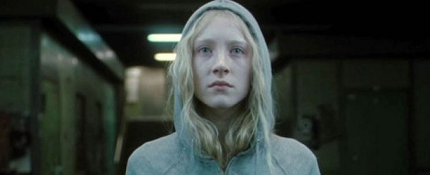Stay tuned throughout September for nuttiness and zaniness of all varieties - click here for the full lineup, and click here for prior entries (which won't do you much good today, what with this being the first - madness!).
 Steven Soderbergh has always been an interesting filmmaker, but for the most part all of his wide variety of films have been centered around: a cool heists (Ocean's Eleven, Twelve, Thirteen, Out of Sight), biographies (Erin Brokovich, Good Night & Good Luck, Che), and the odd (Kafka, Bubble, Schizopolis). Solaris is a venture of sorts for Soderbergh as it is his most intimate film to date. There is no cool sheen to replace substance - only a heart that beats throughout the story.
Steven Soderbergh has always been an interesting filmmaker, but for the most part all of his wide variety of films have been centered around: a cool heists (Ocean's Eleven, Twelve, Thirteen, Out of Sight), biographies (Erin Brokovich, Good Night & Good Luck, Che), and the odd (Kafka, Bubble, Schizopolis). Solaris is a venture of sorts for Soderbergh as it is his most intimate film to date. There is no cool sheen to replace substance - only a heart that beats throughout the story.Chris Kelvin (George Clooney) is urged to the space station by friend and colleague Dr. Gibrarian, whose distressed message to Earth lures him away from his grief of his dead wife. Once aboard the Prometheus Chris finds his friend dead on a slab and two distraught crew members left. There appears to be a small child, but Chris shrugs it off, or at least until he finds out the truth: everyone on the Prometheus has either gone mad, or killed themselves after receiving a "visitor."
Rheya (Natascha McElhone) is Chris's dead wife. At first Chris does not know how to react to her sudden existence. His wife is dead, but Rheya looks like her, speaks like her and shares her memories and feelings. Pain-stricken he traps her into a pod and launches her into space. Chris speaks with Snow and Gordon (Viola Davis) about this phenomena. Gordon theorizes that Solaris is to blame for the facsimiles and warns Chris not to treat her as his dead wife.
After dreaming of her again Rheya appears with Chris the following morning and he decides to make it work. Unfortunately, Rheya becomes self-aware after speaking with Gordon and attempts suicide. She heals almost instantaneously and Chris's determination to keep her alive stops her from completing the act, momentarily.
George Clooney has been extremely brave in choosing roles this past decade. He could have just coasted off of his People's Sexiest Man Alive awards, but instead he chooses films like this and The Men Who Stare at Goats, and Michael Clayton. Hardly box office assurances. The character of Chris Kelvin involves ripping open a lot of still healing wounds and Clooney never sells a false emotion throughout.
For many Solaris 2.0 was merely a love story in space instead of an adaptation of the provocative Lem novel before it. I have never seen the original and can not speak to whether Soderbergh's attempt is better or worse, but I will say that this is a superb drama. What can we really know of the people we love? Rheya's utterings of "I'm suicidal because that's how you remember me." "I'm not the person I remember. I don't remember experiencing these things." suggest that maybe Chris didn't know his wife. These aren't merely replicants but actualized, thinking beings, that probe into our consciousness. It asks the audience, "What really makes us human?"
See also: Film Forager's double-feature review of the original and the remake.
Tomorrow: Kai lists off all of the reasons that Fight Club is his favorite movie.


























4 people have chosen wisely: on "30 dAyS oF cRaZy: Solaris"
Bonjour! Fletch...
This is a very well-written review of a film that I haven't watched yet...with "yet" being the operative word.
My friend, and fellow blogger Sam Juliano, just sent me of copy of the 1972 film Solyaris...Therefore, I think that I will seek this film out to watch too!
Now, the question is which one should I watch first?!?
Merci, for sharing!
DeeDee ;-D
I didn't give the remake much of a chance the first time round but I have come to enjoy it more and more over the years. The novel differs in many ways from both films but most especially in its philosophy. The book celebrated the technological advancements of man and his quest to defy "gravity" in a search for self outside of the Earth's boundaries.
Both Soderbergh and Tarkovsky borrow heavily from "2001: A Space Odyssey" insofar as ideology is concerned.
It is my understanding that both films deviate greatly from the novel (haven't read it yet, though), so looking at them just as films I actually liked them about equally. Soderbergh's is more romantic in tone, while Tarkovsky's is creepier and atmospheric. And you're right, Soderbergh's works really well as a straight drama.
Both are really interesting journeys through the human psyche, I think, just approached differently.
Post a Comment